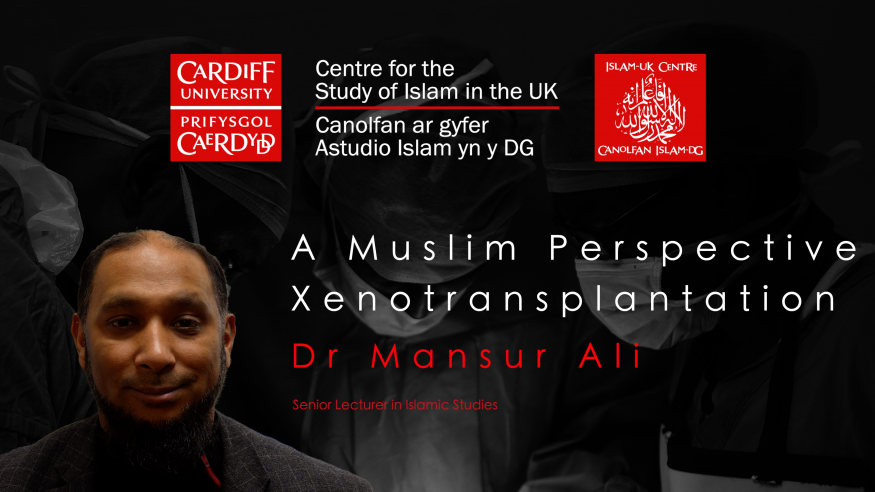A Muslim Perspective: Xenotransplantation Ethics in Islam
18 February 2025
Scroll down for Welsh / Sgroliwch i lawr am y Gymraeg
Wings of Angels, Tails of Donkeys: Xenotransplantation Ethics in Islam
In this lecture, Dr Mansur Ali of the Centre for the Study of Islam in the UK, explores the theological and ethical considerations of transplanting animal organs into humans within Sunni Islam. This future-oriented technology addresses critical organ shortages and has the potential to save lives.
As an Islamic Scholar and Muslim Academic, his work in this area provides an academically rigorous Muslim voice in contemporary debates facing British society and the global community. The lecture highlights the balance between medical advancements and religious principles, emphasizing the humane treatment of animals and the stewardship role of humans.
Theologically, humans are seen as a combination of divine spirit and earthly matter, capable of high moral conduct. Animals, while created to benefit humanity, must be treated with compassion. Ethically, the use of animal parts in medicine is permissible only in cases of dire necessity when no alternatives are available. This principle prioritizes the preservation of human life.
The lecture also discusses practical challenges and ethical concerns, such as immunological responses and zoonotic disease transmission. It emphasizes informed consent and careful consideration of individual patient circumstances. Dr Ali advocates for further research into alternative therapies to reduce reliance on xenotransplantation.
Dr Ali’s role ensures that Muslim perspectives are integrated into ethical guidelines and policies related to xenotransplantation. This engagement fosters a more inclusive understanding of the ethical implications of this technology, contributing to the development of frameworks that respect religious beliefs while embracing medical innovations.
Adenydd Angylion, Cynffon Asynnod: Moeseg Seno-drawsblaniad mewn Islam
Yn y ddarlith hon, mae Dr Mansur Ali o’r Ganolfan Astudio Islam yn y DU, yn archwilio ystyriaethau diwinyddol a moesegol trawsblannu organau anifeiliaid i fodau dynol o fewn Islam Sunni. Mae’r dechnoleg hon sy’n canolbwyntio ar y dyfodol yn mynd i’r afael â phrinder organau hanfodol ac mae ganddi’r potensial i achub bywydau.
Fel Ysgolor Islamaidd ac Academydd Mwslimaidd, mae ei waith yn y maes hwn yn darparu llais Mwslimaidd sy’n drylwyr yn academaidd mewn dadleuon cyfoes sy’n wynebu cymdeithas Prydain a’r gymuned fyd-eang. Mae’r ddarlith yn amlygu’r cydbwysedd rhwng datblygiadau meddygol ac egwyddorion crefyddol, gan bwysleisio’r driniaeth drugarog o anifeiliaid a rôl stiwardiaeth bodau dynol.
Yn ddiwinyddol, mae bodau dynol yn cael eu hystyried yn gyfuniad o ysbryd dwyfol a mater daearol, sy’n gallu ymddygiad moesol uchel. Rhaid trin anifeiliaid, er eu bod wedi’u creu er budd y ddynoliaeth, â thosturi. Yn foesegol, dim ond mewn achosion o anghenraid enbyd y caniateir defnyddio rhannau anifeiliaid mewn meddygaeth pan nad oes dewisiadau eraill ar gael. Mae’r egwyddor hon yn rhoi blaenoriaeth i gadw bywyd dynol.
Mae’r ddarlith hefyd yn trafod heriau ymarferol a phryderon moesegol, megis ymatebion imiwnolegol a throsglwyddo clefydau milheintiol. Mae’n pwysleisio caniatâd gwybodus ac ystyriaeth ofalus o amgylchiadau cleifion unigol. Mae Dr Ali yn eiriol dros ymchwil pellach i therapïau amgen i leihau dibyniaeth ar senotrawsblaniadau.
- October 2025
- February 2025
- January 2025
- December 2024
- April 2024
- March 2024
- June 2023
- May 2023
- April 2023
- March 2023
- February 2023
- January 2023
- December 2022
- October 2022
- February 2022
- September 2021
- July 2021
- February 2021
- December 2020
- November 2020
- July 2020
- June 2020
- May 2020
- February 2020
- July 2019
- March 2019
- February 2019
- November 2018
- July 2018
- June 2018
- April 2018
- January 2018
- October 2017
- August 2017
- July 2017
- June 2017
- April 2017
- July 2016
- March 2016
- April 2015
- March 2015
- February 2015
- December 2014
- November 2014
- October 2014
- September 2014
- August 2014
- April 2014
- March 2014
- January 2014
- December 2013
- November 2013
- October 2013
- September 2013
- June 2010